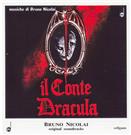|
|
||||
|
by Richard Jack Smith  Below are more soundtrack reviews of recent and archival releases. Anonymous Rejected Film Score (John Murphy, 2011) A catastrophic noise wall displaying scant respect for the ear drums, John Murphy's Anonymous Rejected Film Score carries a clue in the title: it went unused for a reason. A kindred spirit, The Girl with the Dragon Tattoo featured the Nine Inch Nails duo Trent Reznor and Atticus Ross making the same error. Let the sound drone until you forget what's playing. Their thesis? It's a worldly ambience. If so, then the world must be deaf. I rarely put a thumbs down for a score on YouTube. Yet the Anonymous Rejected Film Score made me break that rule. A poem: Bring on the hate Foolish it remained Chato's Land (Jerry Fielding, 1972) **** Delightfully, Chato's Land slips through every attempt to pigeonhole, while sounding like no other Western on the market. Actually, "Western" could be misleading as composer Jerry Fielding invites harmonies and timbres which denote fantasy or drama. He doesn't shy away from spectacle or flamboyance ("Coop Falls") yet the form belongs to Fielding. He shapes, departs, advertises and then reshapes at will. The listener ends up confronted by a constantly shiting presence, mercurial and hypnotic. Chato's Land is a fascinating score. Cliffhanger (Trevor Jones, 1993) **** Free from the distractions in Renny Harlin's film -- including explosions and wintry mountains -- the music of Cliffhanger can settle into a milieu where human emotions dominate. Composer Trevor Jones may have fumbled the otherwise great Runaway Train. However, Cliffhanger places him in the midst of a fine orchestra and the results are polished to a world class performance. Indeed, the cues depicting face-to-face encounters between Walker (Sylvester Stallone) and the villains are brilliant enough. While the need for speed can blemish blockbusters lacking depth, Jones tracks the human pulse closely. During a tragic moment, time morphs into a poetic, slow motion dance. Rarely one to leave us hanging (pardon the pun), he saves the defining musical touch for "Icy Stream/Jessie's Rescue/Hooked Copter/Helicopter Fight." Dramatically, it represents a sudden death scenario. Will it be the hero or the villain who ends up triumphant? Among soundtrack collectors, Cliffhanger holds a special place. With the long out of print Intrada release, it was a welcome surprise for La La Land Records to release this music. Code Name: The Cleaner (George S. Clinton, 2007) **** In many ways the stereotypical soundtrack weaned on Digital Age tropes, Code Name: The Cleaner embraces drum loops and other rhythmic devices deemed cool by synthetic use. However, composer George S. Clinton frequently adds important spices to the mix: sharp brass chords, a casual flute, subtle strings and it grooves well too. Above all, mystery causes the listener to sit forward. In fact, Code Name: The Cleaner would be all mist and magician's drapes except that Clinton micro-manages ideas too vital to go unrewarded. I had fun. The Lord of the Rings: The Two Towers (Howard Shore, 2002) *** Filmmaker Peter Jackson's insistence that every frame of his middle-Earth adaptations should be accompanied by a musical notation pushes the listener away. Roughly 50% of Howard Shore's music for The Lord of the Rings: The Two Towers proves worthy The rest can be deposited into the fires of Mount Doom where the shadows cry. Time to rhyme: Music enough for three The view was narrow Tomorrow Never Dies (David Arnold, 1997) *** Nobody does it better... than John Barry. When it comes to James Bond, Barry reinvented himself. In addition to the famous Monty Norman 007 theme, he was careful to include a new action motif as well as something romantic, especially on woodwinds. Very often, the love theme made a direct correlation with the title song i.e. The Man with the Golden Gun. Following The Living Daylights, he passed the baton to Michael Kamen (Licence to Kill), Eric Serra (Goldeneye) and then David Arnold (Tomorrow Never Dies). The latter creates some cheeky trumpet fanfares and the opening sequence was wonderful. However, apart from this highlight little can match it. Actually, "Doctor Kaufman" and "Carver's Plan" creak via unwanted dissonance. Ultimately, Tomorrow Never Dies needs to be shorter. The spectacle tends to bounce off the heart rather landing seamlessly. This can make the experience feel like a grind. Now it's not a total loss given the brief romantic underscore for Paris (Teri Hatcher). The Adventures of Huckleberry Finn (Franz Waxman, 1939) **** A poem Before A Place in the Sun Well situated to please Nodding to artist, he drew The Fly (Paul Sawtell, 1958) ** Another poem: Swat The Fly Short but not cute The Red Pony (Aaron Copland, 1949) **** Time to rhyme: Emotional beauty: how it breaks Every note on point SCORE OF THE MOMENT Count Dracula (Bruno Nicolai, 1970) ***** With three notes, we are transported to Transylvania. Gothic and dark are fitting descriptors, yet there's beauty too. After all, Bram Stoker told a love story beyond mortal coil. A poem for this hidden gem: A breath, a whisper, running fingers down your back. Music a hot, jagged sigh Listing a chance, the border drew inwards a mist. The neck whose soil was much watered Honorary Score: While the years 1940, 1981 and 1995 among others contain several Scores of the Moment, there are cases where the singular predominates. Here's a prime example: The Charge of the Light Brigade (Max Steiner, 1936) ***** |
||
|
© 2026 - ReelTalk Movie Reviews Website designed by Dot Pitch Studios, LLC |



